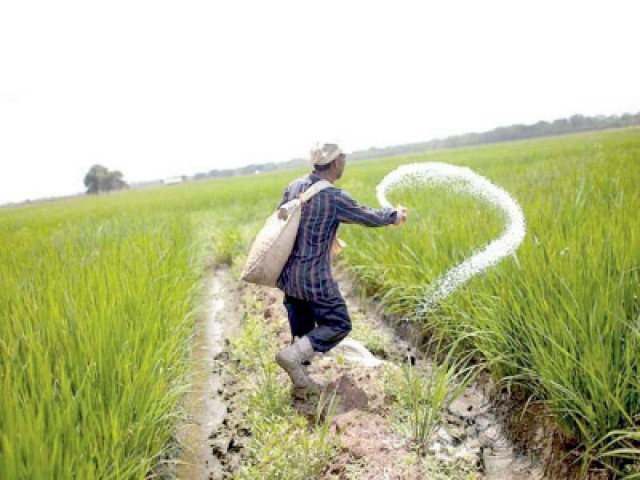Fertiliser shortage, price hike to dent wheat output
Growers fear sugarcane and maize crops also under threat

The increase in prices of di-ammonium phosphate (DAP) fertiliser coupled with unavailability of urea is expected to trigger a drop in wheat production in Pakistan this year.
In a statement on Saturday, Pakistan Businesses Forum (PBF) President Mian Usman Zulfiqar said that output of wheat crop was under threat as farmers had been facing acute shortage of urea since the start of sowing season.
“Despite government’s claims, growers are paying inflated prices in the range of Rs2,500 to Rs2,700 for a 50kg bag of urea,” he said, adding that the official rate was set at Rs1,768.
Recalling his meeting with the minister concerned, Zulfiqar said that the latter termed fertiliser shortage mere propaganda and repeated pleas of PBF to keep agriculture out of politics were disregarded.
“Now, everyone is witnessing the disastrous results of sheer negligence.”
The “artificial shortage” of fertiliser in different districts would dent the per-acre yield of wheat in the ongoing season, he voiced fear.
The government claims that surplus fertiliser is available in the market but growers fear that its shortage will hit sugarcane and maize crops as well.
The federal government has fixed wheat production target at 30 million tons this season against production of 27.3 million tons last year but federal authorities have failed to ensure the availability of DAP and urea fertiliser.
Zulfiqar recalled that relevant departments had flagged the issue in time in September 2021 but no action was taken to address the challenge.
“Farmers are the ultimate victim of mismanagement at the government’s end,” he remarked.
Citing that there were multiple causes of supply and demand gaps, he stated that a few people were accusing the farmers of being involved in panic buying of fertiliser.
“This can be true to some extent but a majority of small-scale growers do not have enough money to resort to panic buying,” he clarified.
“They stand in queues for hours just to receive a couple of bags of urea after proving their identity as farmers.”
He stated that the country had surplus urea, which could be gauged from the fact that fertiliser manufacturers recently sought permission of the federal government to export the commodity.
Zulfiqar cautioned that in case of a shortfall this year, Pakistan would have to produce around 32.5-35 million tons of wheat next year given that the consumption was growing 4-5% annually.
Speaking to The Express Tribune, Agriculture Republic Co-founder Aamer Hayat Bhandara anticipated that wheat production would be lower in the ongoing season owing to multiple reasons.
A twofold increase in prices of DAP was a major reason which would drive the decline in wheat harvest, he said.
“Last year, DAP price stood at Rs4,000 per bag but this year it has doubled to Rs8,000,” he lamented. “This has impacted the sowing of wheat as a sharp increase in rates curtailed the purchasing power of farmers.”
On the other hand, the government also failed to enhance the minimum support price of wheat, which adversely affected the farmers’ income, Bhandara said.
He regretted that urea, which played a vital role in planting crops, was difficult to procure.
“Earlier, farmers were able to find urea at high rates, hence they bought lower quantities,” he pointed out. “Less-than-required application of fertiliser will definitely push down crop production.”
Sindh Chamber of Agriculture President Miran Mohammed Shah confirmed that wheat crop had been suffering to some extent due to the shortage of urea.
On the other hand, the increase in cost of diesel, electricity and the overall inflation burdened farmers with more debt, due to which many of them were not able to use phosphorus fertiliser.
“Despite all these challenges, a bumper crop is coming up,” he forecast. “If procurement is done efficiently, I do not think there will be any shortage.”
Published in The Express Tribune, January 23rd, 2022.
Like Business on Facebook, follow @TribuneBiz on Twitter to stay informed and join in the conversation.



















COMMENTS
Comments are moderated and generally will be posted if they are on-topic and not abusive.
For more information, please see our Comments FAQ